In the middle of the bustling capital, there is a coffee shop quietly located in an ancient house over 100 years old on Chau Long street. But perhaps the special thing that makes 'connoisseurs' want to come here is the rich flavor of Central Highlands coffee and the very special owner - an Ede man.
Coming back to Hanoi from the Ede village, the young man Y Tô Tô Kbuôr (born in 2000) carries with him the desire to preserve the soul of the 'great forest' in every drop of coffee from the sunny and windy highland. To Tô Coffee Shop (No. 23 Châu Long) is where he creates a space full of the Central Highlands' breath in the middle of the city.
From the project "Bringing forests to the city"...
Three years ago, when the "leaving the city for the forest" trend spread, many people left the city to find nature, but most of them could only stay for a few days. At that time, Mr. Dinh Quang Thang - Deputy Director of the UNESCO Youth Creativity Center in Hanoi realized that the essence of the problem was not about leaving, but about how people learn to live in harmony with nature in the environment they are in.
"We can't all return to the forest, but we can bring the spirit of the forest back to the city. By letting nature live with us, not by creating artificial forests," he said.
From that thought, he started the project "Bringing the forest back to the city." That is to revive an old house in the heart of Hanoi into a green space where trees, people and memories coexist. To him, each tree canopy, each moss patch in the house is proof that nature always knows how to return, if people are willing to open their hearts to receive it.
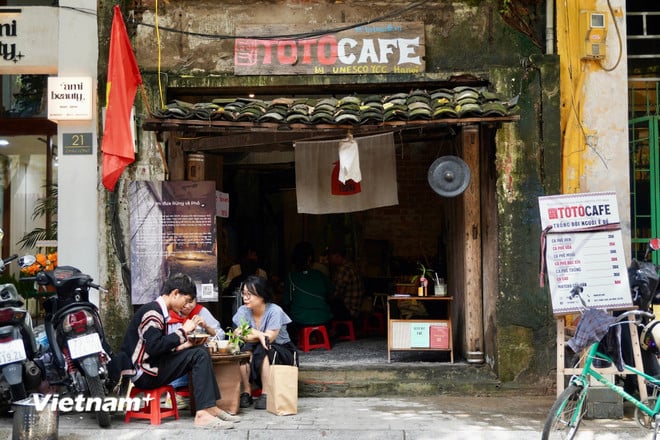
In the heart of bustling Hanoi, there is an ancient house revived by the breath of nature. (Photo: Nguyen Tam/Vietnam+)
For nearly two years, under the guidance of Mr. Dinh Quang Thang - Deputy Director of the UNESCO Youth Creativity Center in Hanoi, young people have been diligently reviving an abandoned house that is over 100 years old. Each layer of rubbish has been cleared away, making way for trees to grow through the roof and grow naturally.
Each material in the house has its own story: a tile from a Tay people's roof in Cao Bang , a wooden door from an ancient house in Hanoi, a hundred-year-old stone mortar from our ancestors...
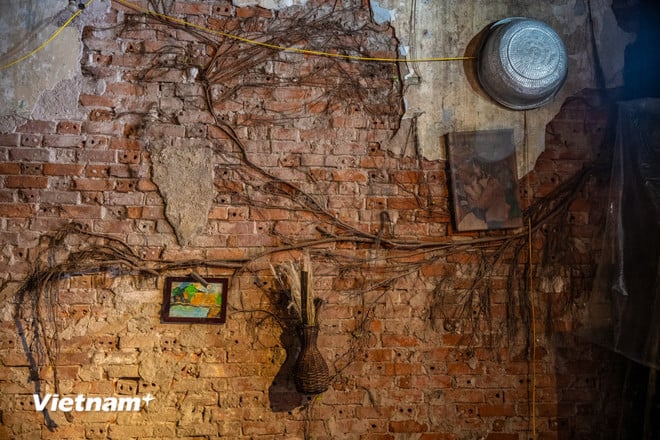
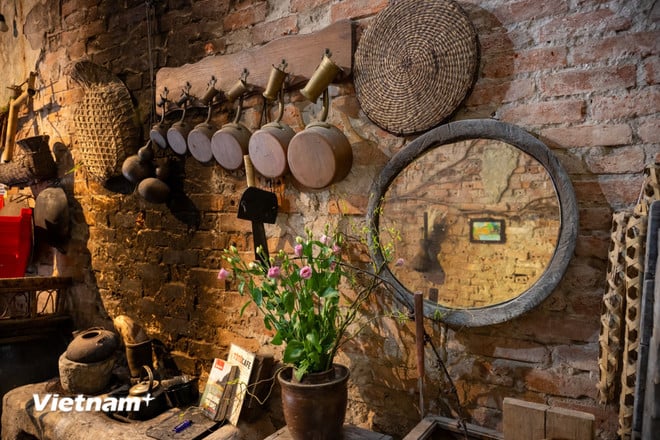
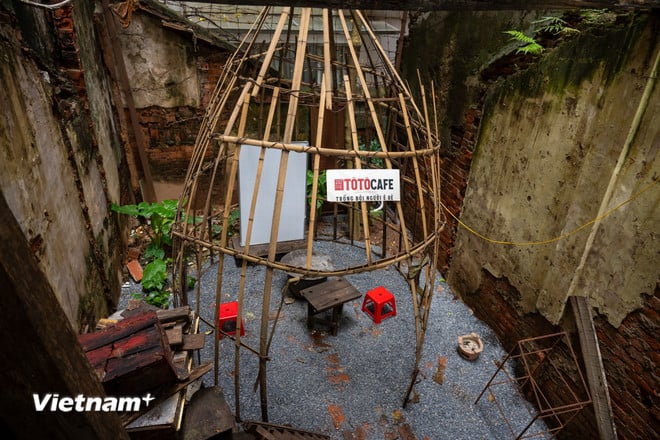
Interior of an ancient house in Chau Long. (Photo: Nguyen Tam/Vietnam+)
Mr. Thang calls it "a forest in the city," a space where people can sit among the trees, breathe in the smell of moist soil and temporarily forget the hustle and bustle of life outside. Mr. Thang believes that if every street has a small corner of forest like that, people will slow down and treat each other more kindly. It is also from that old house that a small coffee shop of the 10X guy was born.
...arrive Bringing coffee beans from the Central Highlands to the capital
The owner of the shop is Mr. Y Tô Tô Kbruôr, commonly known as Tô - a young man born in 2000 from Dak Lak province. After four years of studying in Hanoi, Tô started his journey of cycling to sell coffee through the streets of Hanoi. Nearly two months of riding an old bicycle was also the chance for Tô to meet Mr. Thang.
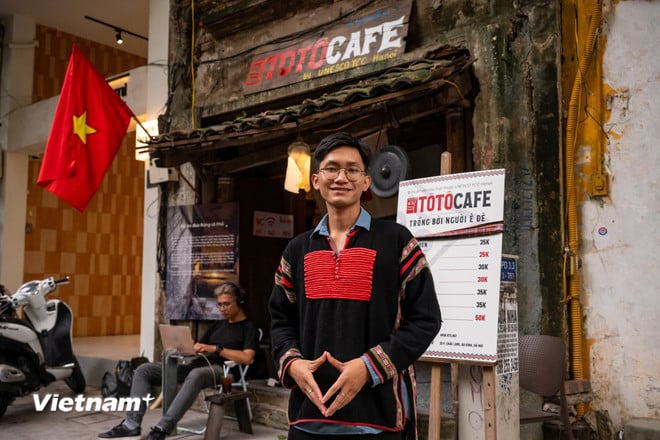
Y Tô Tô Kbuôr - an Ede boy who grew up in Dak Lak province, where coffee is the source of livelihood for many families. (Photo: Nguyen Tam/Vietnam+)
"The first time I entered the house, I felt like there was a forest in the middle of the street. That feeling impressed me immediately," To To recalls. From that meeting, the idea of a coffee shop with the breath of the Central Highlands in an old house was formed.
The space of the cafe is imbued with the Ede culture. To brought family mementos such as brocade, bamboo baskets, long house models, traditional costumes, etc. to decorate the cafe.
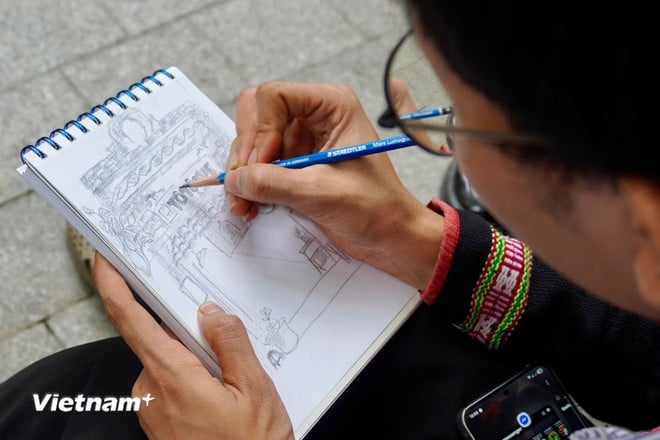
"The first time I entered house number 23, I felt like there was a forest in the middle of the street. That feeling immediately impressed me," To To recalls. From that meeting, the idea of a coffee shop with the breath of the Central Highlands was formed. (Photo: Nguyen Tam/Vietnam+)
The coffee beans of the shop are also grown by the hands of To's father and roasted by hand by To's mother, preserving the purity and quintessence of the land. It is this family bond that creates a unique flavor, both original and imbued with memories, like bringing the whole village to the middle of the city.
"I want customers to not only drink coffee but also understand the story behind each bean. Each cup of coffee reminds them of sunny afternoons in the village," he said.
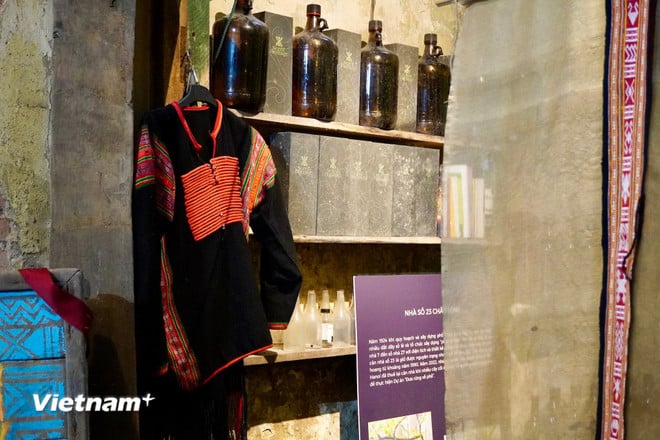
The space of the cafe is imbued with the Ede cultural imprint. To brought family mementos such as brocade, bamboo baskets, ao dai model, traditional dress, etc. to decorate the small cafe on Chau Long Street. (Photo: Nguyen Tam/Vietnam+)
Mornings at To To Coffee Shop often begin with the sound of water dripping through the filter, the smell of roasting smoke lingering in the air. Many regulars say that just sitting quietly under the shade of a tree is enough to feel at peace. "I want to create a place where anyone who comes can feel the slow pace of village life, and can still hear the sound of the forest in the middle of the city," To To said.
The shop has no wifi, no restroom, customers come to the shop as if they are looking for a quiet place. Groups of friends chat softly, some just sit and watch the coffee smoke dissipate in the early morning light, others bring out books to read. The rustic space, the aroma of smoky coffee and the sound of wind blowing through the wooden porch create the feeling of being in a small village in the middle of the city.
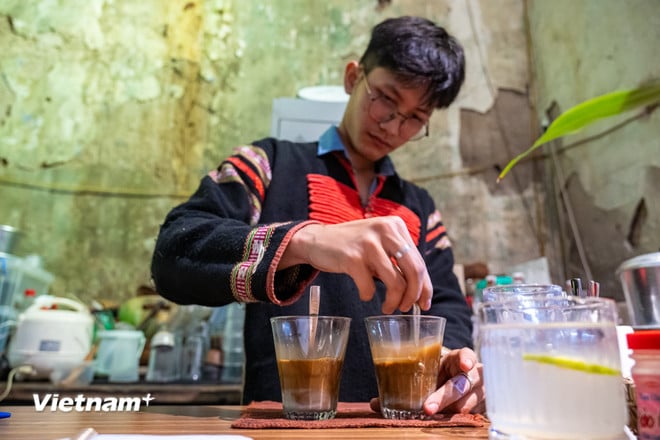
For Y Tô Tô, each cup of coffee is a cultural story, a bond that connects souls who love nature and the green space of the city. (Photo: Nguyen Tam/Vietnam+)
For Y To To, each cup of coffee is a cultural story, a bond connecting souls who love nature and the green space of the city.
According to the 10X shop owner, the Ede coffee here is not roasted by machine but completely by hand, following the process of "3 times of ripening. The red ripe coffee beans are picked from the tree and dried in the sun. After the shell is removed, the beans are roasted a second time over fire, preserving the natural aroma. When ground and brewed in a filter, boiling water cooks the beans a third time, perfecting the original flavor with a bit of mountain breath."
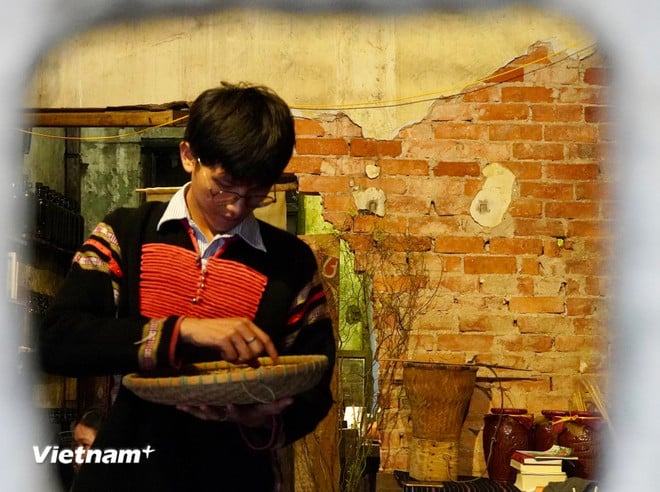
Ede coffee in To To is not roasted by machine but is completely handmade according to the "3 times ripening" process.
To wants to introduce that smell of smoke to friends in the capital and international guests, as a greeting from a remote village in the Central Highlands.
What is special is that the way of roasting coffee here is done according to "oral knowledge", which is a recipe passed down by word of mouth through many generations in the village, mixed with a little secret additive to create a characteristic aroma. The coffee of the shop has a strong Robusta flavor, bitter and sour aftertaste, which is the soul of Central Highlands coffee. Each step in the process requires meticulousness and patience, so that in the end, each cup of coffee carries the full spirit of Ede, in the heart of the bustling city.
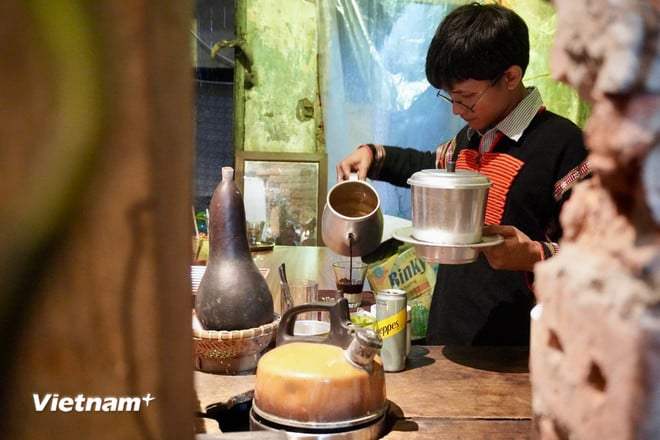
Each step in the process requires meticulousness and patience, so that each cup of coffee carries the Ede spirit in the heart of the bustling city. (Photo: Nguyen Tam/Vietnam+)
According to custom, the Ede people not only enjoy coffee to stay awake but also consider it a moment of community bonding. In the village, everyone drinks from the same cup, taking turns sipping,
When making coffee to treat guests, the Ede people drink from the same cup and then pass it around as a symbol of connection and sharing.
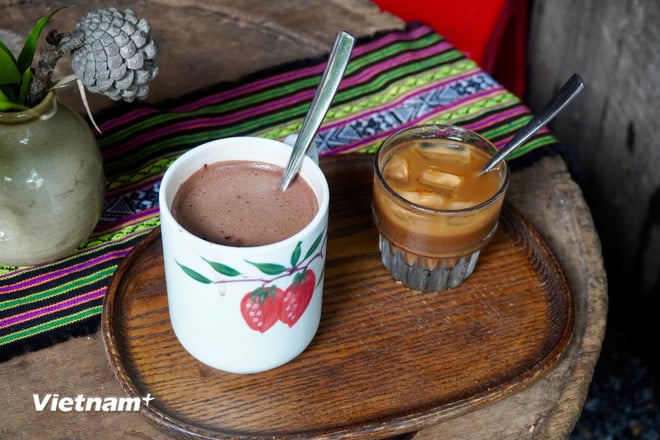
Each cup of coffee retains the flavor of the mountains and forests while also expressing the spirit of solidarity and unity of the Central Highlands people. (Photo: Nguyen Tam/Vietnam+)
At the shop, To cleverly put the coffee in a ceramic pot and poured it into small cups to ensure hygiene but still maintain the spirit of the origin.
Each cup of coffee retains the flavor of the mountains and forests, while also expressing the spirit of solidarity and attachment of the Central Highlands people. Many customers, including foreigners, have come to To To Coffee to enjoy the culture of the highlands.
Here, visitors are also introduced to traditional ethnic items at the shop by To as well as told stories that have been associated for thousands of years with the Ede people.
To shared that sharing culture, building a coffee-loving community and preserving green spaces are the bigger goals of this small project of his./.
(Vietnam+)
Source: https://www.vietnamplus.vn/chang-trai-ede-danh-thuc-huong-vi-tay-nguyen-giua-long-ha-noi-post1072801.vnp


![[Photo] Draft documents of the 14th Party Congress reach people at the Commune Cultural Post Offices](https://vphoto.vietnam.vn/thumb/1200x675/vietnam/resource/IMAGE/2025/10/28/1761642182616_du-thao-tai-tinh-hung-yen-4070-5235-jpg.webp)




![[Photo] President Luong Cuong attends the 80th Anniversary of the Traditional Day of the Armed Forces of Military Region 3](https://vphoto.vietnam.vn/thumb/1200x675/vietnam/resource/IMAGE/2025/10/28/1761635584312_ndo_br_1-jpg.webp)
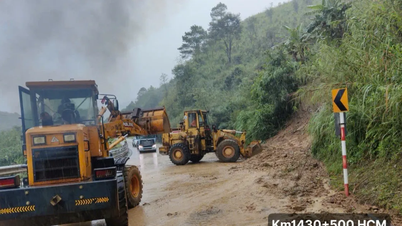





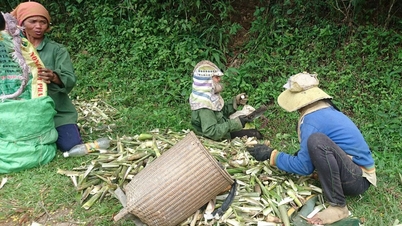


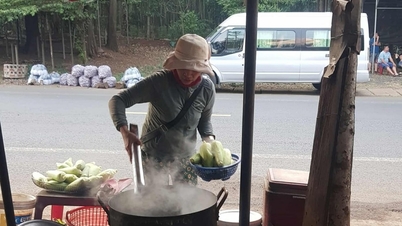

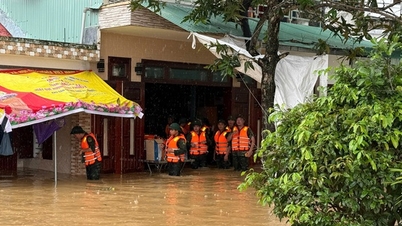

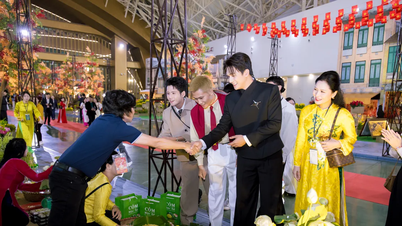
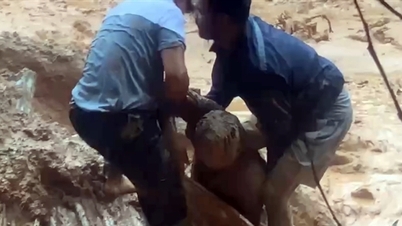

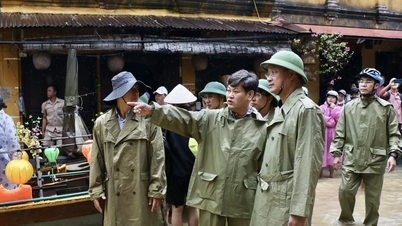



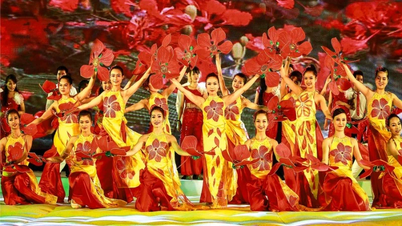







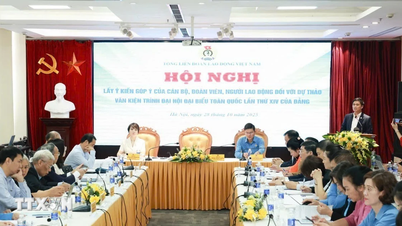
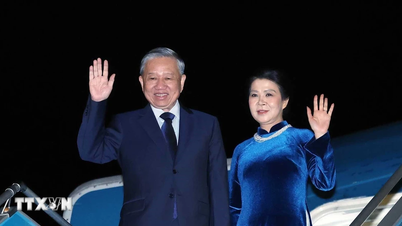



![[Photo] The 5th Patriotic Emulation Congress of the Central Inspection Commission](https://vphoto.vietnam.vn/thumb/1200x675/vietnam/resource/IMAGE/2025/10/27/1761566862838_ndo_br_1-1858-jpg.webp)





















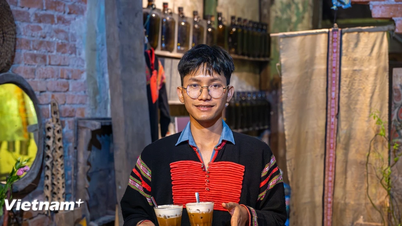



















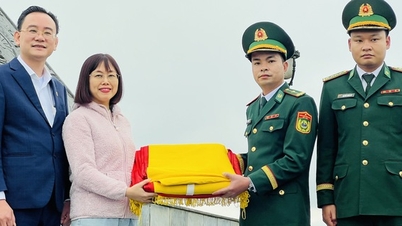

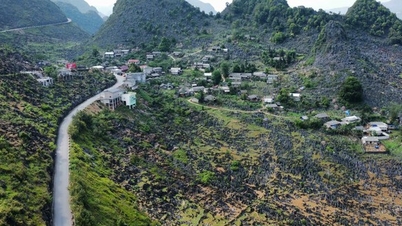
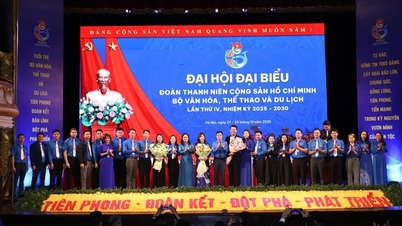


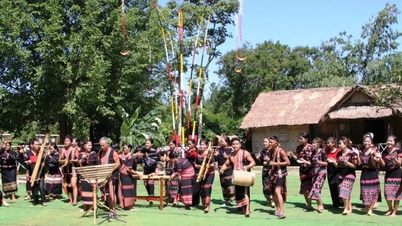

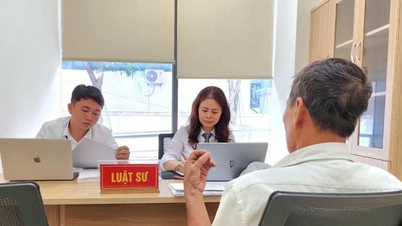

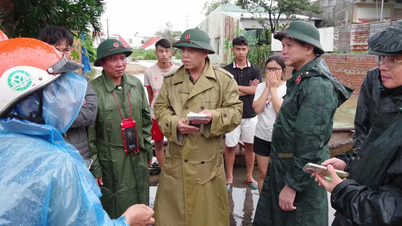
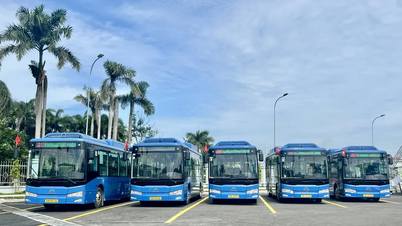
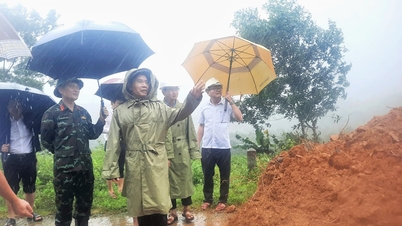
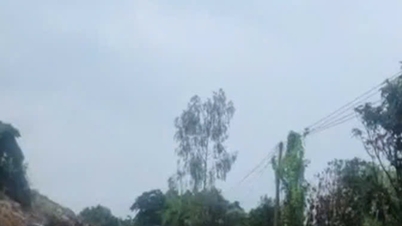

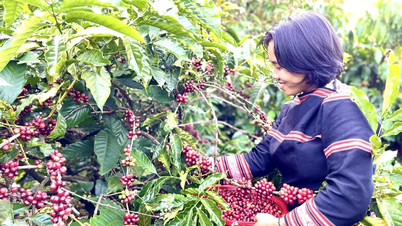













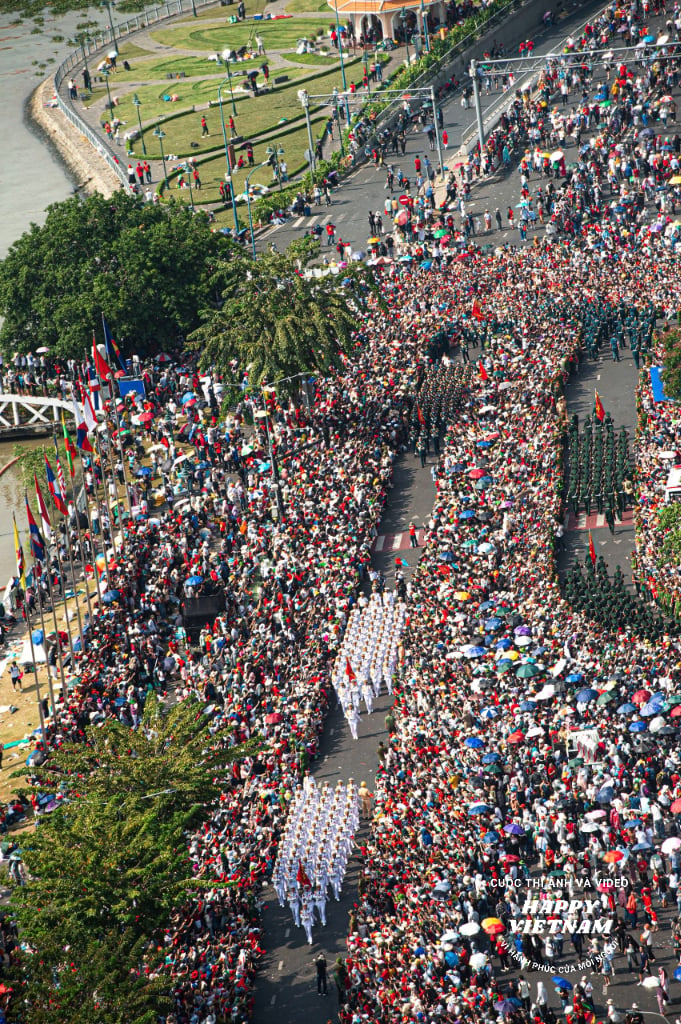

Comment (0)